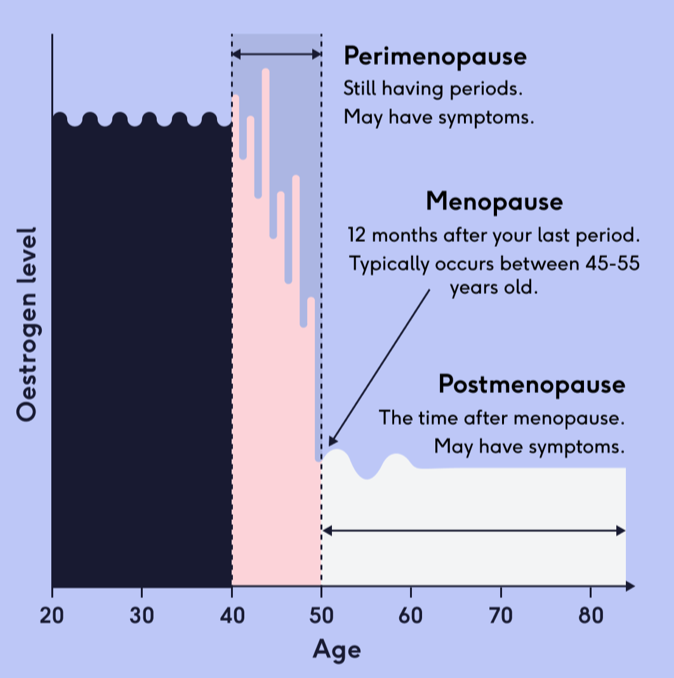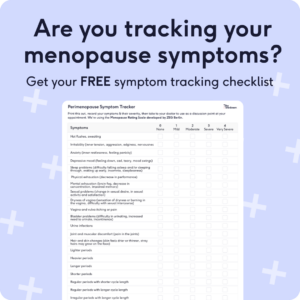
How long after starting HRT do you feel a difference?
What's the lowdown?
HRT should have an impact within the first 3 months of using it
Some women feel the effects in just a few days, whilst with others it takes weeks.
If at 3 months, you feel no difference, then check in with a doctor. The doctor may want to change the dose or the type of HRT
Always work with a healthcare professional if you need to change the type or dose of HRT you are using, don’t try it yourself at home!
There are a number of different reasons that you might not feel the impact of HRT initially – we know it can be frustrating, but it’s not anything to worry about. It might just mean you have to adjust what you’re using
If things still aren’t improving, make sure you and your doctor have ruled out any other medical causes of your symptoms
How does Hormone Replacement Therapy (HRT) work?
During perimenopause and menopause, your hormone levels change. In perimenopause, the number of eggs left in your ovaries dwindles so your hormone levels start to swing up and down desperately trying to force your ovary to release an egg. The main hormone which fluctuates is oestrogen, as shown in the graph below.

Over time, your oestrogen levels drop to a lower level overall. As you pass through menopause, and into the post menopausal phase of life, your oestrogen hormone levels will be at a much lower level. The changes to your oestrogen hormone levels across perimenopause and menopause can cause symptoms. Approximately 85% of women will experience some kind of symptom.
For some, these symptoms will have a really significant impact on quality of life. Menopausal symptoms are treatable, with a number of different medical treatments and lifestyle changes. The most common, and the most effective, treatment for menopausal symptoms is called hormone replacement therapy (HRT). In the US, this is sometimes called menopausal hormone therapy (MHT).
How long do different methods of HRT take to work?
It can take up to 3 months for your HRT to work. In general, doctors will give a 3 month prescription initially to allow you to try HRT. This will be of one form of the oestrogen HRT, alongside a progesterone if you have a womb.
Within 3 months you should be noticing some improvements to your symptoms. These can be hard to notice, so it’s worth tracking them (even if just using a pen and paper) to see if it’s working.

When you add in new hormones to the body, it can take a while for your body to adjust. This can include getting some side effects in the first 3 months. The advice is to be patient until the 3 month mark, as the side effects may subside once your oestrogen levels have been topped up to a more consistent level using HRT.
If you’re having bad side effects between 3-6 months, or you are not seeing improvements to your symptoms, you should see your doctor. This might be because the type of HRT you’ve been given doesn’t suit your body well. The good news is that there are lots of different types and doses of oestrogen HRT that you can try, and there are different forms of progesterone if you get side effects related to progesterone.
With testosterone HRT, it can take up to 6 months to feel the benefits2. If, after 6 months, it is not adding anything then your healthcare practitioner may suggest coming off it. They will monitor your testosterone levels with blood tests to check you’re within a normal range.
How long should you try HRT before noticing a difference?
If your symptoms are significantly impacting your quality of life, and it’s safe for you to have HRT, persisting with it for at least 3 months is advised. At 3 months, doctors can tweak your dose or change the form of HRT you are using to see if things improve. If you’re having no benefits at 3 months, they may also run a blood test to check that you are absorbing the oestrogen properly.
Signs your HRT is or isn’t working
If you track your symptoms over the first 3 months, and nothing improves (or things get worse) then at 3 months you can conclude that HRT is not working as would normally be expected. This is usually because oestrogen is not being absorbed into your bloodstream with the form you are taking. This happens to some women, and not others. For example, some women may not absorb oestrogen well through a patch on the skin, for other women, they may find their skin does not absorb enough of the hormone from the gel. This might mean that the woman should increase the amount of gel (as advised by their doctor) or try a switch to a different patch, spray or tablet form of oestrogen.
If things aren’t working at the 3 month mark, then most doctors recommend making some kind of adjustment to dose or method and trying for another 3 months. Hopefully things will improve, and for many women they will feel improvements within 3-6 months. For some women, this adjustment process can take longer than 3 months. At the end of the day, it’s up to you how long you want to try HRT for based on the benefits you get. Tweaking and adjusting HRT is quite a complex process, and so it should always be done with your doctor.
At what point do you decide the HRT is not working for you?
This is very individual, and it will likely depend on how severe your symptoms are and how much (if any) relief HRT is giving you. There are a number of different forms of HRT, and different doses, which you can try to get the right combination for you. Many women will keep trying for many months. If you do find the right balance of HRT, often it’s worth the wait. If you’re looking to understand more about women’s real life experiences of HRT you can learn more from our lived experiences and HRT reviews.
And finally, how to change your HRT
If you’re not happy with your current HRT, or are struggling with side effects, do consult your doctor after you’ve been taking it for 3 months. We know it can be hard to be patient, but often if you book in an appointment just a few weeks after starting HRT, the advice will be to come back at 3 months. Some women do experience side effects on HRT initially, and for a small number of women these might be quite bad. Side effects should generally subside within 3-6 months of starting HRT, once your body has adjusted to the higher hormone levels. So try to keep going if you can! However, if you are really worried then always do try to speak to a doctor.
If you’ve got to 3 months, and it’s not working to improve your symptoms, chat to your doctor. They may want to run some blood tests, to check you’re absorbing HRT from the type you’ve been prescribed. Or, they may increase the dose or suggest a different format. Exactly what happens will depend on your personal information, and what you share with your own doctor. For a small number of women, it can be tricky to find the right HRT. It’s important that all adjustments to your HRT are done with your doctor, as lots of different factors can be at play. Increasing the dose at home on your own is definitely not advised! If you’re feeling stuck, you can always book in with a menopause clinician.
Good luck with your HRT. And remember, we have reviews of every different type of HRT available in the UK for you to browse. Reading the experiences of other women can help you to make more informed choices, or have more informed conversations with your doctor. And remember, HRT isn’t everything, there’s other ways to help with your menopausal symptoms!
Our medical review process
This article has been medically reviewed for factual and up to date information by a Lowdown doctor.






